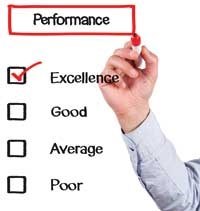
How can you tell whether the on-site property manager at a condominium or homeowners association community is doing a good job? And what is “a good job”? Whether a manager is well-liked and whether he or she manages well may not be the same thing. How do you distinguish one from the other?
Such questions arise whether an association’s board of directors hires the on-site manager or contracts with a property management firm that employs the on-site manager. The major difference is that management firms assume responsibility for periodic performance reviews of on-site managers, although some firms involve their clients in the review process.
If your board hires the manager directly, resources exist to help ensure that your performance-review process is fair and accurately measures his or her performance.
Performance Review Consultants
For a fee, your association can tap into the resources of a consulting firm that will provide forms you can use or adapt, and manage the paperwork and record-keeping. One such vendor is ADP TotalSource, a subsidiary of payroll-processing firm ADP (Automatic Data Processing, Inc.) that provides human-resources services and benefits programs.
“We’ve been with them since the mid-2000s. Everything we use either came from them or was developed through them. We tweaked their program specifically for every position we hire for,” says Tom Smith, senior managing director of Atlantic | Pacific Management, Inc., in Boca Raton and Bay Harbor Islands. With 550 employees, his firm manages more than 14,000 units in 75 condo associations, plus another 8,000 rental units in 15 multifamily buildings.
To find other vendors, Google the search terms “performance appraisal consultants” and “performance review consultants”—but expect that many of the firms listed are targeting clients much larger than your association. Your board’s attorney may be able to offer a referral, and networking at Community Associations Institute (CAI) and Institute of Real Estate Management (IREM) events also may help you find suitable consulting firms.
Helpful Publications
IREM offers three performance-review publications free to members. Others pay a nominal fee.
• An 11-page Job Performance Evaluation ($12.95) “enables the reviewer and individual to assess and document the degree to which the individual has accomplished specified objectives from the previous review. The evaluation includes descriptions of performance ratings and key areas in which the individual is assessed.”
• Select List of Recommended Performance Measures ($5.95) is a form you can customize to set an employee’s “performance goals and expectations.”
• Annual Performance Scorecard ($3.95), also customizable, is “an organized set of performance measures, grouped according to various aspects of performance.”
Winging It
If you’re going to write your own form, first stir your creative juices by collecting some samples of forms created by others. Google the search term “performance review forms” to access forms from such diverse sources as Employee Performance Solutions, Inc. magazine, Massachusetts Institute of Technology, and Microsoft Office.
Then your entire board should conduct a workshop to discuss what performance-review criteria belong on your association’s form.
Darlys Walker, chief executive officer of Condominium Concepts Management, Inc., used the workshop technique to develop the form her company uses today. Based in Atlanta, CCM has 300 employees and manages 18,000 units in 203 condo and homeowners associations in Florida, Georgia, South Carolina, and Tennessee.
“We wanted to know how could we improve our productivity and show our value to the associations,” she says. “When we’re falling short, they don’t always tell us until it’s too late.
“We asked the board of an association in Jacksonville, Florida to help us. Their community is a 300-unit garden-style apartment complex that was converted to condos. The board held a roundtable discussion and reported, ‘These are the things that are important to us.’ That board developed a quarterly management-review form which we now ask all of our boards to complete, and we also ask that the boards do an annual survey of all the owners.”
Maintenance Tops CCM List
The board that developed the CCM form was most concerned with “the physical condition of the asset,” Walker says. “Is it being maintained? Is the staff being managed to get maximum efficiency out of the community? Is the property clean? Is the pool functional, and did it pass code inspection? Is the landscaping neat and manicured, and free of weeds? Is the sprinkler system leaking?”
The board went into considerable detail with respect to physical condition issues. “They wanted to break it down minutely,” Walker says. “Even in HOAs, if the common elements are in disrepair—that will affect the home’s resale value.”
Weekly, CCM’s managers are supposed to walk their entire property and report any problems to the board. The performance-review form covers whether the manager provided such reports, and whether he or she has addressed any deficiencies such as loose gutters on buildings, leaky sprinkler heads, light bulbs out in the common elements, and broken curbs.
Other Items
Monetary matters comprised the second most important set of issues, detailing whether the manager fulfilled his or her fiduciary responsibility to keep expenses in line and collect fees. Walker says specific questions include: “Have we reduced expenses? Are your categories exceeding, under, or at budget? Is your delinquency less than one percent of total income? Is there an aggressive collections policy, and is it being followed? Are you always looking to fine-tune operations? Are you bidding out services to ensure that you’re getting the best prices?”
Walker’s firm prepares an action-item list with each board, prioritizing the various tasks and assigning completion dates to them within 30, 60, 90, 180, and 360 days. “We want to review those tasks and make sure they are completed within the time frame the board has given us,” Walker says.
The CCM list also covers responsiveness and follow-through. All emails and phone calls are supposed to be returned by the end of the business day if received by 4 p.m., or the next day if received later. “Board members have 24/7 access to management and staff for emergencies or whatever,” Walker says. “They need to answer their phone and emails. If a board member is calling, even on the weekend, they need to respond.”
Response Time is Critical
Customer-service response is the most critical item on the performance-review checklist at Tobin Properties, Inc., in Hollywood, says Natasha Falconi, the firm’s president. Tobin has 25 employees and manages both condos and homeowners associations in South Florida.
“Many people make the mistake of not responding when they don’t have an answer,” Falconi says. “These are your customers. Response time is critical, and so is turnaround time on projects.”
Unlike CCM, Tobin puts less emphasis on the budget results than on the budgeting process. “We measure the thoroughness and detail of how a manager puts the budget together, with an explanation for every line item. Then if the budget goes over and doesn’t match the target, the manager might not have control over it,” Falconi says.
The form Tobin is using originated with a consultant some years ago. Now the consultant is long gone and Tobin periodically tweaks the form in-house. “Every couple of years we enhance it a bit to match what’s going on,” Falconi says. “Right now a lot of capital-improvement jobs are underway, so the current form reflects the need for follow-up in that area.”
Tobin also asks its managers annually to review themselves, detailing “where their successes have been, their top accomplishments for the year, where they think they could have done better, and what support they need,” Falconi says.
Although the formal review is important, Falconi stresses the importance of top management communicating throughout the year with each on-site manager, to understand what he or she is working on at all times. “Our managers have plenty of autonomy,” she says. “They work independently but with a support system behind them. They know when to ask for assistance.”
Residents Don’t Participate
Unlike CCM, Tobin and Atlantic & Pacific don’t allow residents to participate directly in reviewing their manager. “They’re our employees,” Smith emphasizes. “We’re always looking for feedback, and we’ll take it into account, but not through the formal performance-review process.”
If a manager receives a poor review, the board may or may not know. In either case, Smith says, “the board should handle it as business as usual. They shouldn’t treat the manager any differently. It’s not really their job. It’s us as third-party management to take care of the problem. If it’s extremely bad, most of the time we already know about it and have done something about it.”
Smith says the “something” typically involves a plan for improvement, and positive feedback when the manager follows it. “Managers want to be recognized for what they’ve done,” he says. “It gives them a sense of pride.”
For managers who perform above the norm, boards may recommend giving a bonus. “Sometimes we’ll recommend bonuses to the client—either an annual bonus, or a bonus for a special project such as a major roof replacement or hallway refurbishing, something out of the normal scope where the manager put in extra hours and effort to help oversee it,” Smith says.
“Since they’re our employees, it’s up to the management company. Ultimately a bonus is paid by the client. It comes through our payroll system but is charged back to the client.”
George Leposky is a freelance writer and is a frequent contributor to The South Florida Cooperator.






Leave a Comment